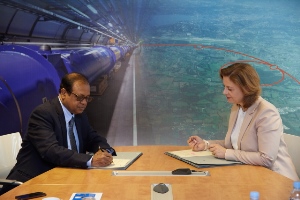
An International Cooperation Agreement (ICA) to enhance scientific cooperation in High Energy Physics between the scientific community of Sri Lanka and the European Organization for Nuclear Research (CERN), was signed in Geneva on Wednesday (8 February 2017). Minister of Science, Technology & Research, Susil Premajayantha and the Director for International Relations of CERN, Ms. Charlotte Warakaulle signed on behalf of the two parties.
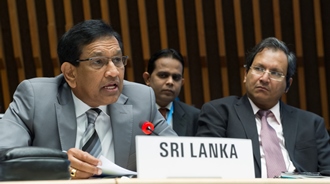
Delivering a keynote addressed at the World Health Organisation (WHO) meeting on ‘Rehabilitation 2030: A Call for Action’, in Geneva on Monday (6th February) Minister of Health, Nutrition and Indigenous Medicine Dr Rajitha Senaratne said that the Government of Sri Lanka has identified Rehabilitative Health Services as the third pillar of Sri Lanka’s health care delivery system, in addition to the earlier focus on curative and preventive health services. Minister Senaratne was invited by the WHO, together with Minister of Health of Botswana and Deputy Minister of Health of Lao People’s Democratic Republic to deliver the keynote addresses at the meeting, and share the experience of their country efforts in rehabilitation services.
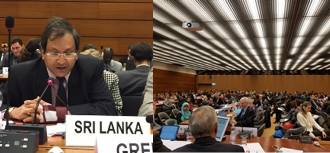
Switzerland, a co-chair of the UN intergovernmental consultations on the modalities for the process for adoption of the ‘Global Compact for safe, orderly and regular migration’, has commended the Abu Dhabi Dialogue (ADD) chaired by Sri Lanka, for its proactive action to seek close engagement in the process of development of the Global Compact on Migration (GCM). Mr. Pietro Mona, Deputy Head, Global Program on Migration and Development of the Swiss Agency for Development and Cooperation, acknowledged the leadership of Sri Lanka and the ADD troika, which also includes Kuwait and the United Arab Emirates (UAE), for initiating such a dialogue within the ADD, even before the resolution on modalities for the intergovernmental negotiation on the Global Compact was adopted by the UN General Assembly.
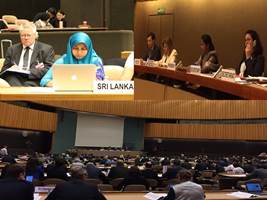
Sri Lanka said that it supports the establishment of a Group of Governmental Experts (GGE) on Lethal Autonomous Weapons Systems (LAWS) in 2017, within the framework of the Convention on Certain Conventional Weapons (CCW) and to elevate the dialogue on LAWS to a State –driven formal process.
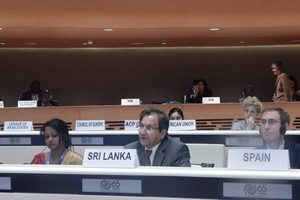
The Director General of International Organization for Migration (IOM) Ambassador William Lacy Swing commended Sri Lanka’s dynamic leadership in Migration in connection with the important role played by Sri Lanka as the current chair of the Colombo Process. In particular Ambassador Swing highlighted the development of the five thematic areas ; Skills and Qualification Recognition, Ethical Recruitment, Pre-departure Orientation, Remittances and Labour Market Trends, under Sri Lanka’s chair of the Colombo Process.

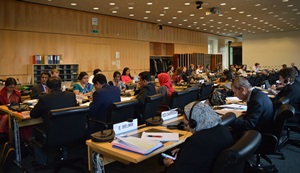
Consideration of the Fifth Periodic Report of Sri Lanka under the Committee Against Torture (CAT) took place at the 59th Session of the Committee Against Torture, held at the Palais Wilson in Geneva, on 15-16 November 2016. Hon. Jayantha Jayasuriya, PC, Attorney General of Sri Lanka and Leader of the Sri Lanka delegation introduced the report.
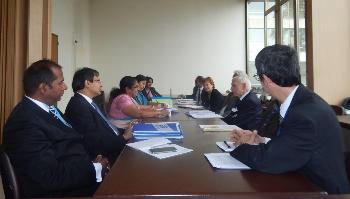
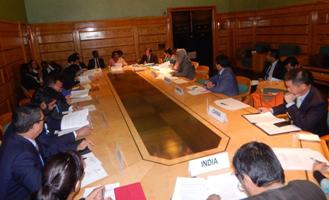
The International Organization on Migration (IOM) has expressed readiness to further enhance its assistance to Sri Lanka, by providing training and capacity building support for the Ministries of Foreign Employment and Foreign Affairs, and to the Sri Lanka Foreign Employment Bureau (SLBFE). It was agreed to extend cooperation in the areas of countering human trafficking and people smuggling operations, providing short-term internship opportunities with the IOM for the relevant officials as well as supporting the upgrading of the consular services of the Ministry of Foreign Affairs. The IOM also pledged to continue technical and secretarial support for the Colombo Process (CP) - the regional consultative forum of contractual labour originating countries in Asia, currently chaired by Sri Lanka.
These assurances were given when Minister of Foreign Employment Thalatha Atukorale who was in Geneva last week to attend the 6th Global Meeting of Chairs and Secretaries of Regional Consultative Processes on Migration met with the Director General of IOM Ambassador William Lacy Swing, to discuss and follow up progress on Sri Lanka’s bilateral cooperation with the IOM. Sri Lanka’s Permanent Representative to the UN in Geneva Ravinatha Aryasinha, Deputy Permanent Representative Samantha Jayasuriya, Counsellor Shashika Somaratne, and Acting Deputy General Manager of the Foreign Employment Bureau D.G.G.S. Yapa, were associated with the Minister.
- Minister Thalatha Atukorale says “Colombo Process will seek to be a bridge between labour sending and receiving countries in Asia”
- Director General of WHO commends President Sirisena for advancing the health sector in Sri Lanka
- Sri Lanka committed to see expedited transformation into sustainable development
